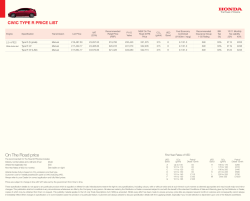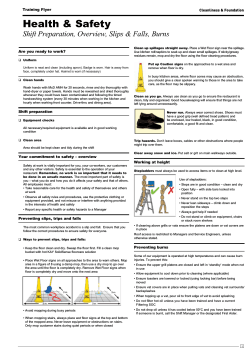
HOW TO REGISTER FOR VALUE ADDED TAX FIJI REVENUE & CUSTOMS AUTHORITY
HOW TO REGISTER FOR VALUE ADDED TAX FIJI REVENUE & CUSTOMS AUTHORITY CONTENTS 2 What is Value Added Tax The role of the Registered Person Compulsory Registration What is a Taxable Activity How is the Value of Supplies calculated What are exempt supplies Returns and Taxable Periods Accounting Basis for VAT How and When to Register Cancellation of registration PART A 1. What is Value Added Tax (VAT) Value Added Tax (VAT) is a tax on spending that is levied on the supply of goods and services in Fiji at the rate of 15%, with effect from 1st January 2011. The tax is collected on behalf of the Government by businesses and organizations which have been registered with the Inland Revenue Services. The overall administration of this tax is handled by the Fiji Revenue & Customs Authority (FRCA). The VAT Decree requires most businesses and organizations involved in taxable activities in Fiji to: • register with FRCA’s Inland Revenue Services (IRS) within 21 days of becoming so liable; • charge and collect 15% VAT applicable to the range of goods and services they supply; • lodge their VAT Returns and pay the VAT collected to the Inland Revenue Services when due. 2. The Role of the Registered Person Any person, a business, or an organization which has registered for VAT purposes is called a “Registered Person”. The role of the Registered person is to charge Value Added Tax on 2 2 3 4 4 4 4 5 5 6 all its taxable supplies. The tax that he charges and which he passes to the consumer is known as the “output tax”. He is however entitled to claim “input tax” on business related expenses. A registered person claiming a deduction for VAT paid is required to complete an Input Tax schedule and submit it with the VAT return for the period. The registered person is required to hold Tax Invoices for that supply. No credit will be allowed without tax invoices. As VAT is not meant to be a cost to the businessman, the VAT Return to be lodged with the Inland Revenue Services will reflect the “difference’ or the “Net” tax. The tax paid on purchases including VAT paid on imports for taxable activity (input tax) will be deducted from the tax charged (output tax) and the difference, if any, will be paid to the IRS or a refund made by IRS as the case may be. Thus the VAT Return will be a self assessed Return. The registered person will be required to: • keep adequate records; • account for VAT on taxable supplies made and received; • prepare and lodge with IRS, VAT returns for each taxable period’ • pay and tax and penalties owing by the due date; • supply tax invoices (with their tax identification inserted on it) to consumers and other registered persons whom they 3 • • • provide taxable supplies to; account for VAT on any assets retained from a taxable activity upon ceasing to be registered; notify IRS of change of status (e.g. Change of Address etc) notify IRS within 21 days of ceasing all taxable activities. Failing to fulfil these obligations could result in additional tax and/or penalties being imposed. PART B 1. Compulsory Registration Who is required to register? Any person conducting a taxable activity in Fiji whose turnover in any 12 month period exceeds or is likely to exceed FJ$100,000.00, with effect from 1st January 2012, whether the person solely supplies goods (other than a produce supplier) or services is required to register with the IRS. A “Produce Supplier” is a person who, in the course or furtherance of all taxable activities carried on by that person, supplies produce and the supply of that produce constitutes at least 90% of that person’s total value of supplies and the balance of the goods and services supplied by that person is produce but not in a raw and unprocessed state. Any business which also supplies produce and other goods and services may register its branch or division and thereby exempt the supply of the “produce supplier” as define above, from the Value Added Tax. Although a “produce supplier” is not required to register for VAT purposes, any person who qualifies as a “produce supplier” can register like any other business and charge VAT on its supply and obtain input credits for VAT paid by them. For the purposes of VAT, “Person” means: • an individual • a company • an incorporated club or society • a joint venture • a trustee of a trust • an estate • a public or local authority • a partnership Note: For VAT, it is not the business activity which is registered, but the person who conducts it. The registration covers all the business activities of that person. If the person conducting the business activity is an organization (i.e., not an individual) it is the organization that must register. The individual members or partners do not have to register for VAT purposes. The registration of trustees of a trust or estate is in the name of the trust or estate. What is a taxable activity? A taxable activity means any activity which is carried on continuously or regularly by any person, whether or HOW TO REGISTER FOR VALUE ADDED TAX not for pecuniary profit, and involves or is intended to involve, in whole or in part, the taxable supply of goods and services to another person for a consideration. It includes any activity conducted as a business, trade, profession, manufacture, vocation, association or club. The term also includes the activities of public and local authorities. A number of activities are not taxable activities, these include: • private recreational pursuit or hobby; • employment as a salary or wage earner or engagement as a company director or office holder; • private transactions. (e.g. the occasional sale of domestic or household items, personal effects or private motor vehicles.) • any activity carried on by a non-profit body, other than an activity, which in the opinion of the Commissioner is in competition or to the disadvantage of any taxable activity carried on by any other person. How is the value of supplies calculated? The total value of supplies is generally the total amount that will be charged for goods and services provided during a 12 month period. It will include the value of: • goods and services sold or provided in Fiji; which is subject to 15% VAT. • exported goods; which are subject to VAT at 0%. • services supplied overseas, which may be subject to 15% VAT Reverse Charge. It will not include amounts received or the making of exempt supplies. What are exempt supplies? Exempt supplies include following: the • • • • • • 4 supply of financial services; supply of accommodation in a residential dwelling; supply of education by an educational institution; supply of any goods and services incidental to the provision of education by an educational institution; supply and provision of the right to partake in any gambling; supply by any non-profit body of donated goods and services. VAT is not chargeable on the supply of exempt goods and services. The supplier will not be able to claim any input tax credit involving purchase or production of exempt supply. 2. Returns and Taxable Periods How often will VAT returns have to be furnished? The period covered by the VAT return is referred to as the taxable period. Registered persons, whose annual turnover is FJ$300,001.00 or more, will have to lodge monthly VAT returns, with effect from 1st January 2012. Registered persons, whose annual turnover is FJ$300,000.00 or less, will have to lodge yearly VAT returns. However they may submit an application requesting for lodgment of monthly VAT returns instead of yearly VAT returns, but this will be subject to the Commissioner of Inland Revenue’s discretion. Every registered person will be required to furnish to the Commissioner of Inland Revenue a tax return no later than the last working day of the month following the last day of the taxable period. For which 12 month period is the value of supplies calculated? Value of supplies is to be calculated on an ongoing basis. Two periods need to be considered, the past 12 months and the next 12 months. For example, by 1st April 2012, a person should: 5 • • estimate the total value of supplies of goods or services from all taxable activities for the period 1st April 2011 to 31st March 2012.If this exceeds FJ$100,000.00, registration is required. estimate the total value of supplies for the next 12 months. If this exceeds FJ$100,000.00, then registration is required. 3. How and When to register? If required to register, a registered person must complete all the sections in one of the following relevant forms: However a registered person may apply to account for VAT on payments basis and this will be subject to the Commissioner of Inland Revenue’s discretion. Application of Registration of Sole Trader Businesses form (IRS001). You must submit one of the following plus your business licence when registering: o driver’s licence & Wheel Tax Certificate. o FNPF card. opassport. o official ID card. Application of Registration of Companies, Partnerships or Trusts (IRS003). You must submit the following: • for a partnership (whether or not a written partnership deed exists), a copy of its Partnership Deed/Agreement. • for a trust (including a unit trust), a copy of its’ Deed of Trust. • for an estate of a deceased person, a copy of probate statement from the executor. • for a charitable organization or nonprofit body, a copy of its’ Certificate of Incorporation and Memo/Articles of Association/Registration Certificate. • for a company whether public or private a copy of its’ Certificate of Incorporation and Memo/ Articles of Association. The Payments Basis generally means that the registered person accounts for VAT in the taxable period in which a payment is made or received. A business license needs to be submitted in addition to the above requirements in the case only of a trading business. The main difference between the invoice basis and the payments basis is that debtors and creditors are not taken into account in determining the total supplies/sales for VAT purposes A site inspection would need to be carried out by Inland Revenue Services before a Tax Identification Number (TIN) is issued. Once registered, no matter what the total value of supplies, that person will have to: • keep proper VAT records • make regular VAT returns • account for VAT on all taxable supplies 2. Accounting Basis for VAT How to account for VAT in returns? How VAT is accounted for depends on the accounting basis that is adopted. Every registered person is required to account for VAT on an Invoice Basis. Accounting for VAT on an Invoice Basis generally means that in relation to supplies made the registered person accounts for the VAT in the earliest taxable period in which: • an invoice for the supply is issued, or • any payment is received • delivery of goods and services takes place. • • The completed registration form can HOW TO REGISTER FOR VALUE ADDED TAX be either posted or hand delivered to the Customer Enquiry Center of Inland Revenue Service as soon as possible. 4. Cancellation of Registration. A registered person shall cease to be liable to be registered where at any time; the Commissioner of Inland Revenue is satisfied that the value of that person’s taxable supplies in the next 12 months will not exceed FJ$100,000.00. 6 in writing to cancel the registration. The Commissioner shall cancel the person’s registration with effect from the last day of the taxable period during which the Commissioner was so satisfied or from such other date as may be determined by the Commissioner. The Commissioner shall notify that person of the date on which the cancellation of registration takes effect. Where a registered person is a produce supplier he may apply for cancellation of registration at any time after having been registered for a period of twelve months. Every person who ceases to be liable to be registered may request the Commissioner of Inland Revenue REMEMBER THAT FAILURE TO REGISTER IS A CRIMINAL OFFENCE AND CAN RESULT IN SEVERE PENALTIES. FIJI REVENUE & CUSTOMS AUTHORITY Head Office Fiji Revenue & Customs Authority Revenue & Customs Services Complex Cnr of Ratu Sukuna Rd & Queen Elizabeth Drive Private Mail Bag, Suva, Fiji Islands Phone: (679) 324 3000 Fax: (679) 331 5537 Website: www.frca.org.fj Customs Service Taxation Division (Inland Revenue Service) Suva Revenue & Customs Services Complex Private Mail Bag, Suva, Fiji Islands All Income Tax and VAT Enquiries Toll Free Line: 0800 331 7834 Phone: (679) 331 2800 Fax: (679) 330 4936 or: (679) 330 2130 Risk & Compliance Suva Revenue & Customs Services Complex Private Mail Bag, Suva, Fiji Islands Phone: (679) 324 3000 Toll Free Line: (679) 331 7070 Suva All Compliance, Debt Management & Lodgement Enquiries: Phone: (679) 324 3000 Fax: (679) 330 2993 Lautoka General Office: Tavewa Avenue, Lautoka Phone: (679) 666 0966 Fax: (679) 666 5961 Lautoka Tavewa Avenue Phone: (679)666 0966 Fax: (679) 666 7734 Nadi Airport Phone: (679) 672 2122 Fax: (679) 672 5390 Labasa Phone: (679) 881 1399 Fax: (679) 881 2354 Levuka Phone: (679) 344 0008 Fax: (679) 344 0425 Savusavu Phone: (679) 885 0727 Fax: (679) 885 0728 Nausori Air Services Office Phone: (679) 347 8299 Disclaimer The information in this document are subject to change without notice. For more infformation, please contact the Taxpayer Education and Publicity Unit on Phone: (679) 3243000 Fax: (679) 3302 321 e-mail: info@frca.org.fj or cectaxquerysuv@frca.org.fj
© Copyright 2025














